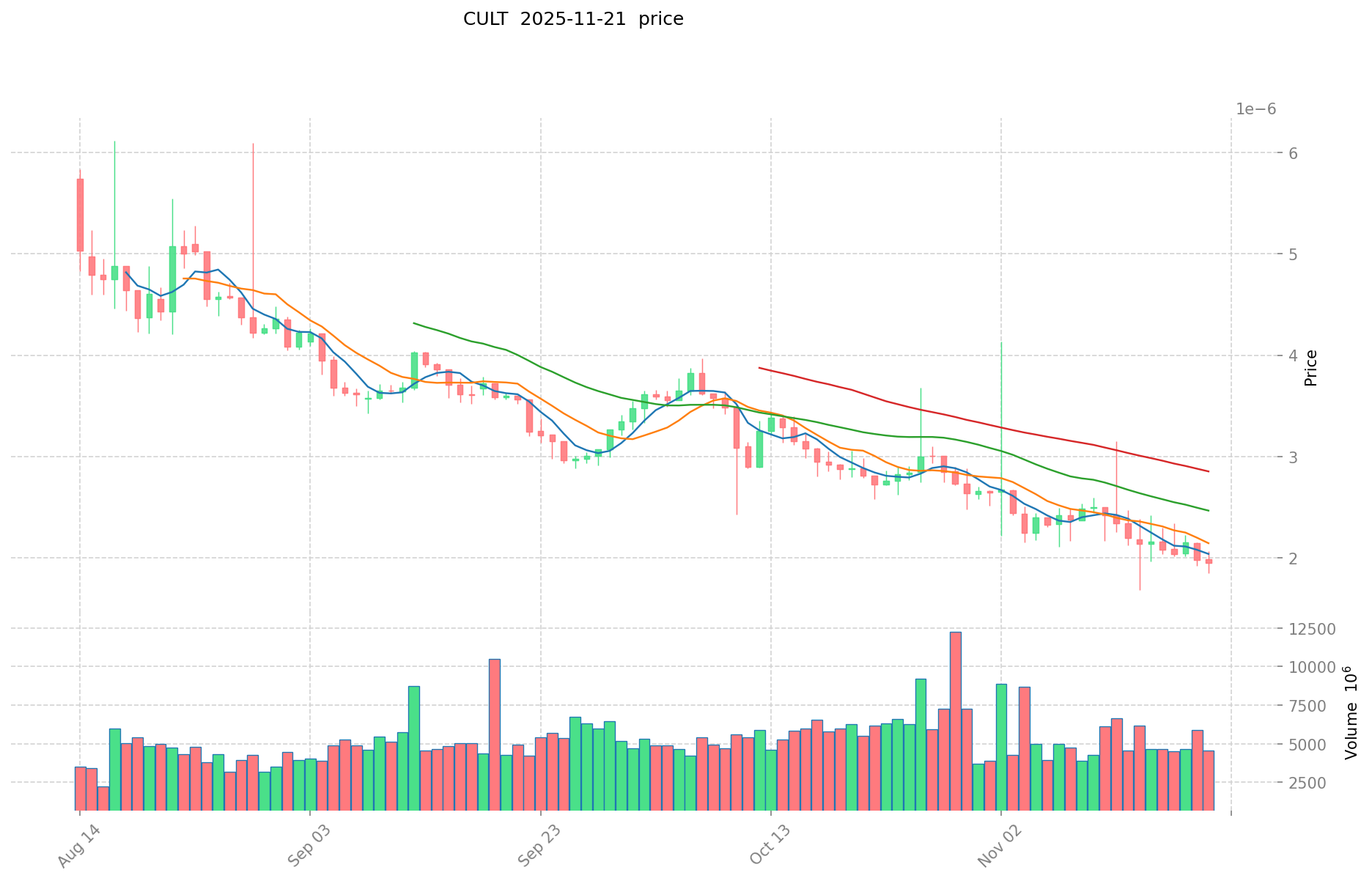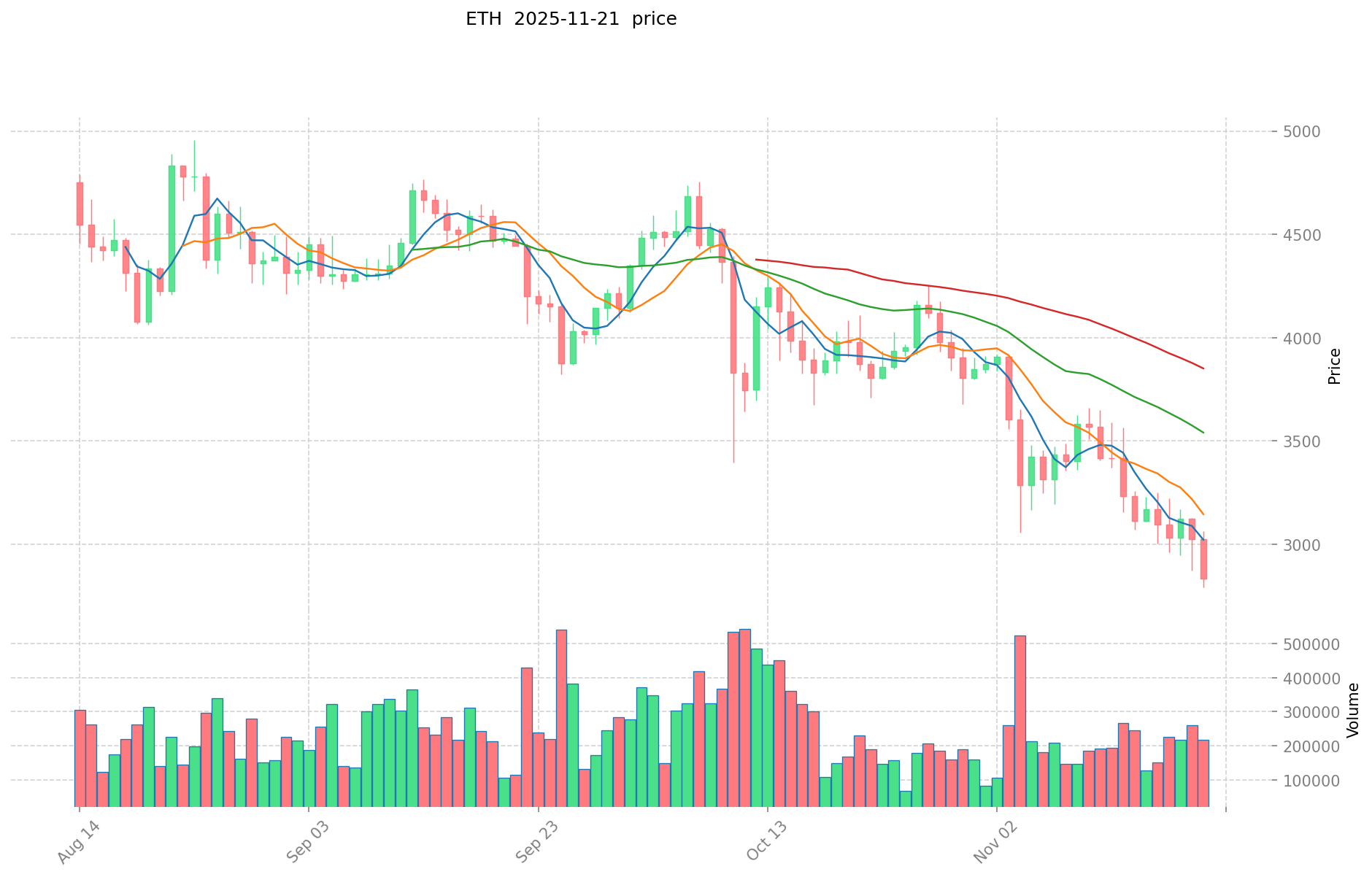CULT vs ETH: The Battle for Decentralized Finance Dominance
Introduction: CULT vs ETH Investment Comparison
In the cryptocurrency market, CULT vs ETH comparison has always been a topic that investors cannot avoid. The two not only have significant differences in market cap ranking, application scenarios, and price performance, but also represent different crypto asset positioning.
CULT (CULT): Since its launch, it has gained market recognition for its focus on funding decentralized technology investments.
Ethereum (ETH): Since 2015, it has been hailed as the foundation for decentralized applications and smart contracts, and is one of the cryptocurrencies with the highest global trading volume and market capitalization.
This article will comprehensively analyze the investment value comparison between CULT and ETH, focusing on historical price trends, supply mechanisms, institutional adoption, technological ecosystems, and future predictions, and attempt to answer the question investors care about most:
"Which is the better buy right now?"
I. Price History Comparison and Current Market Status
CULT and ETH Historical Price Trends
- 2022: CULT reached its all-time high of $0.00007459 on April 2, 2022, followed by a significant decline.
- 2025: ETH achieved its all-time high of $4,946.05 on August 25, 2025, showcasing strong growth in the crypto market.
- Comparative Analysis: In recent market cycles, CULT has dropped from its peak of $0.00007459 to a current price of $0.000001856, while ETH has shown more resilience, currently trading at $2,751.28 after reaching its all-time high earlier this year.
Current Market Situation (2025-11-22)
- CULT current price: $0.000001856
- ETH current price: $2,751.28
- 24-hour trading volume: CULT $10,343.82 vs ETH $711,109,174.15
- Market Sentiment Index (Fear & Greed Index): 14 (Extreme Fear)
Click to view real-time prices:
- View CULT current price Market Price
- View ETH current price Market Price


II. Core Factors Affecting CULT vs ETH Investment Value
Supply Mechanism Comparison (Tokenomics)
- CULT: Deflationary model with 0.4% tax on each transaction (0.4% burned)
- ETH: Deflationary post-EIP-1559 with base fee burning mechanism
- 📌 Historical pattern: Deflationary mechanisms in both assets support long-term value appreciation, though ETH's larger market presence provides more historical data for pattern analysis.
Institutional Adoption and Market Applications
- Institutional holdings: ETH is significantly more adopted by institutions with established ETFs and institutional investment vehicles
- Enterprise adoption: ETH is extensively used in enterprise blockchain applications, DeFi protocols, and payment systems; CULT remains primarily focused on decentralized investment
- Regulatory attitudes: ETH faces more regulatory scrutiny but also enjoys greater regulatory clarity; CULT operates in a more ambiguous regulatory environment
Technology Development and Ecosystem Building
- ETH technology upgrades: Transition to proof-of-stake, sharding implementation plan, and Layer-2 scaling solutions position it for improved scalability
- CULT technology development: Focus on decentralized investment mechanisms to fund revolutionary projects
- Ecosystem comparison: ETH dominates in DeFi applications, NFT marketplaces, and smart contract implementation; CULT's ecosystem is primarily centered around its investment protocol and dCULT governance token
Macroeconomic and Market Cycles
- Inflation environment performance: ETH has shown some anti-inflationary properties due to its deflationary mechanism and utility value
- Macroeconomic monetary policy: Both assets show sensitivity to interest rates and dollar strength, with ETH demonstrating stronger correlations to traditional markets
- Geopolitical factors: ETH has greater cross-border transaction volume and infrastructure; both potentially benefit from financial uncertainty scenarios
III. 2025-2030 Price Prediction: CULT vs ETH
Short-term Prediction (2025)
- CULT: Conservative $0.0000013135 - $0.00000185 | Optimistic $0.00000185 - $0.000002664
- ETH: Conservative $2671.38 - $2754 | Optimistic $2754 - $3359.88
Mid-term Prediction (2027)
- CULT may enter a growth phase, with estimated price range $0.000002322453 - $0.00000290306625
- ETH may enter a consolidation phase, with estimated price range $2151.474372 - $4524.424047
- Key drivers: Institutional capital inflow, ETF, ecosystem development
Long-term Prediction (2030)
- CULT: Base scenario $0.000002817637684 - $0.000003807618493 | Optimistic scenario $0.000003807618493 - $0.000004987980225
- ETH: Base scenario $3166.80539513074875 - $5555.798938825875 | Optimistic scenario $5555.798938825875 - $7389.21258863841375
Disclaimer: This analysis is based on historical data and market projections. Cryptocurrency markets are highly volatile and unpredictable. This information should not be considered as financial advice. Always conduct your own research before making investment decisions.
CULT:
| 年份 | 预测最高价 | 预测平均价格 | 预测最低价 | 涨跌幅 |
|---|---|---|---|---|
| 2025 | 0.000002664 | 0.00000185 | 0.0000013135 | 0 |
| 2026 | 0.00000327265 | 0.000002257 | 0.00000155733 | 21 |
| 2027 | 0.00000290306625 | 0.000002764825 | 0.000002322453 | 48 |
| 2028 | 0.000003995863331 | 0.000002833945625 | 0.000002352174868 | 52 |
| 2029 | 0.000004200332508 | 0.000003414904478 | 0.00000221968791 | 83 |
| 2030 | 0.000004987980225 | 0.000003807618493 | 0.000002817637684 | 105 |
ETH:
| 年份 | 预测最高价 | 预测平均价格 | 预测最低价 | 涨跌幅 |
|---|---|---|---|---|
| 2025 | 3359.88 | 2754 | 2671.38 | 0 |
| 2026 | 3270.9258 | 3056.94 | 2231.5662 | 10 |
| 2027 | 4524.424047 | 3163.9329 | 2151.474372 | 14 |
| 2028 | 5612.50057131 | 3844.1784735 | 2191.181729895 | 38 |
| 2029 | 6383.25835524675 | 4728.339522405 | 4444.6391510607 | 70 |
| 2030 | 7389.21258863841375 | 5555.798938825875 | 3166.80539513074875 | 100 |
IV. Investment Strategy Comparison: CULT vs ETH
Long-term vs Short-term Investment Strategies
- CULT: Suitable for investors focused on decentralized investment potential and revolutionary project funding
- ETH: Suitable for investors seeking ecosystem growth, DeFi exposure, and potential store of value
Risk Management and Asset Allocation
- Conservative investors: CULT: 5% vs ETH: 95%
- Aggressive investors: CULT: 20% vs ETH: 80%
- Hedging tools: Stablecoin allocation, options, cross-currency portfolio
V. Potential Risk Comparison
Market Risk
- CULT: Higher volatility, lower liquidity, and potential for rapid price swings
- ETH: Correlation with broader crypto market, susceptibility to macroeconomic factors
Technical Risk
- CULT: Scalability, network stability
- ETH: Network congestion, gas fee fluctuations
Regulatory Risk
- Global regulatory policies may have different impacts on both assets, with ETH likely facing more scrutiny due to its larger market presence
VI. Conclusion: Which Is the Better Buy?
📌 Investment Value Summary:
- CULT advantages: Focus on decentralized investment, potential for high growth in niche market
- ETH advantages: Established ecosystem, institutional adoption, technological upgrades
✅ Investment Advice:
- New investors: Consider a small allocation to CULT, with a larger focus on ETH for stability
- Experienced investors: Balanced approach with a higher allocation to ETH, but potential for higher CULT exposure
- Institutional investors: Primarily ETH-focused with potential small CULT allocation for diversification
⚠️ Risk Warning: The cryptocurrency market is highly volatile. This article does not constitute investment advice. None
VII. FAQ
Q1: What are the main differences between CULT and ETH? A: CULT focuses on funding decentralized technology investments, while ETH is the foundation for decentralized applications and smart contracts. ETH has a larger market cap, higher trading volume, and more institutional adoption.
Q2: Which cryptocurrency has shown better price performance recently? A: ETH has shown more resilience in recent market cycles. While CULT has dropped significantly from its all-time high, ETH is currently trading at $2,751.28 after reaching its all-time high earlier in 2025.
Q3: How do the supply mechanisms of CULT and ETH compare? A: Both CULT and ETH have deflationary models. CULT has a 0.4% tax on each transaction that is burned, while ETH uses a base fee burning mechanism implemented after EIP-1559.
Q4: What are the key factors affecting the investment value of CULT and ETH? A: Key factors include supply mechanisms, institutional adoption, market applications, technology development, ecosystem building, and macroeconomic conditions.
Q5: How do the long-term price predictions for CULT and ETH compare? A: By 2030, CULT's base scenario price range is predicted to be $0.000002817637684 - $0.000003807618493, while ETH's base scenario range is $3166.80539513074875 - $5555.798938825875.
Q6: Which cryptocurrency is considered more suitable for conservative investors? A: ETH is generally considered more suitable for conservative investors due to its established ecosystem, institutional adoption, and relative stability compared to CULT.
Q7: What are the main risks associated with investing in CULT and ETH? A: Both face market risks, technical risks, and regulatory risks. CULT has higher volatility and lower liquidity, while ETH faces network congestion issues and is more susceptible to macroeconomic factors.
Q8: How should investors approach allocating between CULT and ETH? A: Conservative investors might consider allocating 5% to CULT and 95% to ETH, while more aggressive investors might allocate 20% to CULT and 80% to ETH. However, individual allocations should be based on personal risk tolerance and investment goals.
Share
Content